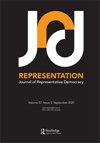Do We Need Taagepera’s Quantitatively Predictive Logical Models in Political Science? Evidence from Polish Local Elections
Q2 Social Sciences
引用次数: 0
Abstract
ABSTRACT Rein Taagepera, considerably assisted by Matthew S. Shugart, is an author and advocate of one of the most interesting methodological approaches in recent years; and this applies not only to political science but also – more broadly – to social sciences based on quantitatively predictive logical models. This method consists of constructing – based on deduction and the principles of logic – a conceptual logical model which is subsequently supposed to be subject to testing by dint of a statistical analysis of empirical data. In this paper, on the basis of an analysis of the works by Taagepera and Shugart on the subject, a comprehensive reconstruction of the said approach shall be conducted. The quantitatively predictive logical model of the number of seat-winning parties in the electoral district shall serve as an exemplary pattern of constructing and – more importantly – it will allow for testing the predictive powers of this sort of models. So far no one has tried to test this model by looking at data from local elections. A large sample of electoral districts obtained from Polish local elections in 2018 gives such a unique opportunity.政治学中我们需要Taagepera的定量预测逻辑模型吗?波兰地方选举的证据
摘要Rein Taagepera在Matthew S.Shugart的大力协助下,是近年来最有趣的方法论方法之一的作者和倡导者;这不仅适用于政治科学,而且更广泛地适用于基于定量预测逻辑模型的社会科学。这种方法包括基于演绎和逻辑原理构建一个概念逻辑模型,该模型随后应通过对经验数据的统计分析进行测试。本文在分析Taagepera和Shugart关于这一主题的作品的基础上,对上述方法进行了全面的重建。选区赢得席位政党数量的定量预测逻辑模型应作为一种示范性的构建模式,更重要的是,它将允许测试这类模型的预测能力。到目前为止,还没有人试图通过查看地方选举的数据来测试这个模型。从2018年波兰地方选举中获得的大量选区样本提供了这样一个独特的机会。
本文章由计算机程序翻译,如有差异,请以英文原文为准。
求助全文
约1分钟内获得全文
求助全文
来源期刊

Representation
Social Sciences-Sociology and Political Science
CiteScore
3.50
自引率
0.00%
发文量
31
期刊介绍:
This change in scope follows two paths. Firstly, it seeks contributors who are interested in exploring the interface between democratic practice and theory. In particular, this focus seeks contributions that apply theoretical insights to actual examples of current practice. Secondly, while not neglecting the current focus of the journal, we would like to expand its international coverage so that the journal will offer our readers insights in the state of democracy worldwide.
 求助内容:
求助内容: 应助结果提醒方式:
应助结果提醒方式:


